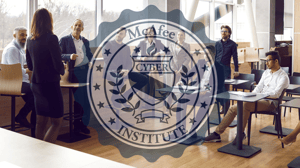
Renewal is a personal and public statement about your commitment to the profession and to yourself. Accomplished intel and investigative professionals around the world recognize that their professional learning and growth never ends.
Benefits of Renewing Your Certification
TOUCH
Third Party Validation & Searchable Database
Third Party Validation & Searchable Database
Active/Current certification holders are searchable by their credential/can be verified by employers & courts.
TOUCH
Participate in Special Discussions
Participate in Special Discussions
Opportunities to participate in national intelligence and investigative industry studies and task forces.
TOUCH
Establish Crediblity & Trust on Your Resume
Establish Crediblity & Trust on Your Resume
Ability to add your certification/credentials & digital badge to your LinkedIn page, Resume, Business cards and more.
TOUCH
Free Resources & Tools for your Job.
Free Resources & Tools for your Job.
Exclusive emailed offers with free professional development tools, new jobs opportunities, and resources.
TOUCH
Renew Updated Credentials
Renew Updated Credentials
Digital certificate updated with new expiration date every time you renew.
TOUCH
Special Offers, Scholarships and More
Special Offers, Scholarships and More
Ability to receive occasional discounts on M.I. renewal fees.
Certification Renewal
The intelligence and investigative sectors face ongoing changes and emerging threats that impact how intelligence and investigative professionals meet their organizations and or agencies needs. As such, the knowledge and skills investigators need to possess to provide professional assurance and consulting services continually evolve. The McAfee Institute requires their board-certified professionals to enhance their knowledge, skills, and other competencies through continuing professional development. This requirement helps ensure that professionals in our sector remain competent in the growing and dynamic profession of intelligence and investigations.Moreover, those who have obtained a professional board certification through The McAfee Institute (henceforth referred to as “certified individuals”) are required to obtain continuing professional development. This document outlines the continuing professional education (CPE) requirements for all McAfee Institute certifications and specifies the CPE reporting process for certified individuals who wish to keep their certifications in good standing.

Biennial Reporting Requirements
The McAfee Institute requires certified individuals to self-attest every two years (biennial) that they have met the CPE requirements outlined in this document. CPE reporting requirements vary depending on the program in which the professional is certified. To maintain an active McAfee Institute certification individuals are required to: Obtain and attest to the completion of the required CPE credit hours on a biennial basis. Obtain and attest to at least two hours of ethics biennially. Abide by and attest to their compliance with The McAfee Institute’s Code of Ethics. Details regarding each of these requirements, as well as hardship exemptions, can be found in the sections below.

Biennial CPE Hours
To retain your certification, you will have to earn and submit CPE credits during the two year certification period in order to renew.CECI – 30 CPE Credits
CCP – 30 CPE Credits
COSINT – 25 CPE Credits
CASIP – 30 CPE Credits
CPCI– 30 CPE Credits
CCIP – 25 CPE Credits
CCII – 20 CPE Credits
SMIA – 15 CPE Credits
CCFI – 20 CPE Credits
CDCI- 25 CPE Credits
CCTA – 25 CPE Credits
CORCI – 20 CPE Credits
CTFI – 25 CPE Credits
WVTS – 18 CPE Credits
CSMIE- 30 CPE Credits
CFHI- 15 CPE Credits
CEFI – 15 CPE Credits
CHTI – 25 CPE Credits
CEL – 20 CPE Credits
For individuals who hold multiple certifications, the CPE hours earned for attending another board certification may be applied toward their required CPE hours for the first certification earned. In other words, if a practicing individual holds both the CECI and CPCI, and completes 30 hours of training related to fraud and investigations, those hours can be used to satisfy the CPE requirements for both the CECI and CPCI.
More information regarding educational program criteria, how CPE hours are measured, acceptable curriculum, and other activities for which certified individuals can earn CPE hours are provided here.

Qualifying CPE Activities
One of the most common ways certified individuals earn CPE hours is by completing educational programs. In fact, certified individuals may earn all of their required biennial CPE hours by attending such programs.Therefore, the McAfee Institute has established criteria to ensure that educational programs maintain a high standard of quality. For a CPE program to be deemed acceptable by the McAfee Institute, it must meet all of the following criteria:
- Be a formal program of learning that contributes directly to the professional competence of the certified individual.
- Clearly state program objectives, which specify the level of knowledge the participants should have attained, or the level of competence to be demonstrated upon completion of the program.
- Clearly state education or experience prerequisites, if appropriate for the program.
- Be developed by individuals who are qualified in the subject matter and instructional design.
- Provide current program content.
- Provide evidence of program completion or participation and the appropriate number of CPE hours earned (e.g., a certificate of completion).
-1.png?width=300&name=Untitled%20(Facebook%20Post)-1.png)
We Recognize the following CPE Programs
The McAfee Institute recognizes the following professional education and development programs as meeting the aforementioned criteria:- Seminars and conferences provided by national, state, or local law enforcement, fraud, loss prevention, or similar investigative or intelligence-based organizations.
- Technical sessions at meetings of national/federal, state, or local law enforcement, fraud, loss prevention, or similar investigative or intelligence-based chapters (e.g., training provided during a McAfee Institute event).
- Formal in-house training programs that meet the aforementioned educational program requirements.
- Relevant industry-specific educational programs provided by other professional organizations or societies.
- College or university courses enrolled in and passed (credit and noncredit courses with C grade or better) after successful completion of our certification programs are eligible for CPE.
- Formal correspondence and self-study programs relevant to intelligence and or investigations that meet program criteria, including evidence of completion.

CPE Reporting Process
Every two years, certified individuals receive a notification from The McAfee Institute reminding them of their biennial obligation to report CPE hours.Certified individuals report their CPE hours by submitting and reporting them inside their student accounts. If you have earned them through us they will be there automatically.
A separate CPE reporting form is required for each certification held. Supporting documentation (e.g., certificate of training completion) should not be submitted at this time.
In addition to reporting their completion of the required CPE hours, as stated earlier, certified individuals must indicate whether they conform with the Standards and attest to their compliance with The McAfee Institute’s Code of Ethics.
.png?width=300&name=Untitled%20design%20(18).png)
.png?width=120&height=60&name=McAfee%20(3).png)
-1.png?width=120&height=60&name=McAfee%20(3)-1.png)
